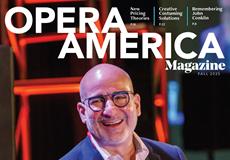Ten Inductees join the newly formed Opera Hall Of Fame
Launched on the Occasion of Its 50th Anniversary
OPERA America is pleased to announce the inaugural group of inductees to the Opera Hall of Fame. The Opera Hall of Fame recognizes the achievements of outstanding living American artists, administrators, and advocates who have strengthened the art form and the field. It was established in 2020 on the occasion of OPERA America’s 50th anniversary, a celebration of the progress of the industry over the past half-century.
The following 10 people have been invited to join the Opera Hall of Fame:
- Patricia K. Beggs, general director emerita, Cincinnati Opera
- Grace Bumbry, international soprano
- Matthew Epstein, artist manager; former artistic director, Lyric Opera of Chicago; artistic advisor, the Santa Fe Opera
- Simon Estes, bass-baritone and humanitarian
- Gordon Getty, composer, philanthropist, and trustee, Ann and Gordon Getty Foundation
- David Gockley, general director emeritus, San Francisco Opera; former general director, Houston Grand Opera
- Camille LaBarre, managing director, The Metropolitan Opera
- George Shirley, international tenor and teacher
- Dawn Upshaw, international soprano and teacher
- Roma Wittcoff, trustee, Opera Theatre of Saint Louis and Arizona Opera
See below for profiles of each of the inductees.
The honorees were selected from a pool of 199 nominations submitted by members and the public at large. Nominations were scored by a panel of field stakeholders representing a diversity of job roles, tenures, and geography. The final selection was made by an independent committee that included Sarah Billinghurst Solomon, trustee, the Metropolitan Opera and the Santa Fe Opera, and former assistant manager/artistic, the Metropolitan Opera; Frayda B. Lindemann, president and CEO, the Metropolitan Opera, and immediate past board chair, OPERA America; Wayne S. Brown, president and CEO, Michigan Opera Theatre, and former director of music and opera, the National Endowment for the Arts; and Charles MacKay, former general director, the Santa Fe Opera, and emeritus trustee, OPERA America.
The 2020 inductees will enter the Opera Hall of Fame alongside those formerly recognized through the NEA Opera Honors, administered by the National Endowment for the Arts in collaboration with OPERA America from 2008 to 2011. The past NEA Opera Honorees include figures like John Adams, Martina Arroyo, Carlisle Floyd, Richard Gaddes, Marilyn Horne, Lotfi Mansouri, Leontyne Price, and Julius Rudel.
“This year marks OPERA America’s 50th anniversary, but the focus of our commemoration is on the growth and success of opera in America over these past 50 years. We created the Opera Hall of Fame to shine a spotlight on some of the leaders who made indelible contributions to the art form and the field during that period,” expressed Marc A. Scorca, president and CEO of OPERA America. “These artists, administrators, and advocates laid the groundwork for opera to become what it is today in North America, and their ground-breaking work continues to shape the field as we look toward the future.”
An induction ceremony for the inaugural class will be held in early 2022 in New York City. An installation will also be created to honor all the members of the Opera Hall of Fame in the Sherrill Milnes Honors Gallery at OPERA America’s National Opera Center in Manhattan.
The inaugural year of the Opera Hall of Fame was made possible with the generous support of the Theodore H. Barth Foundation Inc.
Nominations are now being accepted for the 2021 cycle of the Opera Hall of Fame. For more information and to submit nominations, visit Opera Hall of Fame.
Inaugural Honorees
Fred Cohn, editor of Opera America Magazine, compiled short stories about each of the honorees.






